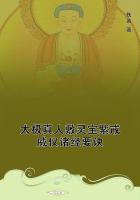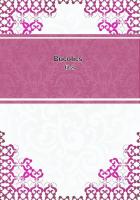Scarcely had the door closed on him when, emboldened by his last words to ask a question she greatly wished, yet dreaded to ask, Maude turned to John and said, "Am I much pitted?"
Rolling up his eyes and wholly mistaking her meaning, John replied, "I aint no great of a physiognomer, but when a thing is as plain as day I can discern it as well as the next one, and if that ar' chap haint pitied you, and done a heap more'n that, I'm mistaken."
"But," continued Maude, smiling at his simplicity, "I mean shall I probably be scarred?"
"Oh, bless you, not a scar," answered John, "for don't you mind how he kep' the iled silk and wet rags on yer face, and how that night when you was sickest he held yer hands so you couldn't tache that little feller between yer eyes. That was the spunkiest varmint of 'em all, and may leave a mark like the one under yer ear, but it won't spile yer looks an atom."
"And Louis?" said Maude, "is he disfigured?"
"Not a disfigurement," returned John, "but the ole governor, he's a right smart sprinklin' of 'em, one squar' on the tip of his nose, and five or six more on his face."
Thus relieved of her immediate fears Maude asked many questions concerning Louis, who she learned had not been very sick.
"You can see him afore long, I reckon," said John, and in a few days she was able to join him in the sitting room below.
After a while Hannah returned to her post of duty, her beauty unimpaired, and herself thoroughly ashamed of having thus heartlessly deserted her master's family in their affliction. As if to make amends for this she exerted herself to cleanse the house from everything which could possibly inspire fear on the villagers, and by the last of August there was scarce a trace left of the recent scourge, save the deep scar on the end of the doctor's nose, one or two marks on Louis' face, and a weakness of Maude's eyes, which became at last a cause of serious alarm.
It was in vain that Louis implored his father to seek medical aid in Rochester, where the physicians were supposed to have more experience in such matters. The doctor refused, saying, "'twas a maxim of his not to counsel with anyone, and he guessed he knew how to manage sore eyes."
But Maude's eyes were not sore--they were merely weak, while the pain in the eyeball was sometimes so intense as to wring from her a cry, of suffering. Gradually there crept into her heart a horrid fear that her sight was growing dim, and often in the darkness of the night she wept most bitterly, praying that she might not be blind.
"Oh, Louis," she said to her brother one day, "I would so much rather die than to be blind, and never see you any more--never see the beautiful world I love so much. Oh, must it be? Is there no help? "
"James De Vere could help us if he were here," answered Louis, his own tears mingling with his sister's.
But James De Vere had left Hampton for New Orleans, where he would probably remain until the winter, and there could be no aid expected from him. The doctor, too, was wholly absorbed in thoughts of his approaching nuptials, for Maude Glendower, failing to secure the wealthy bachelor, and overhearing several times the remark that she was really getting old, had consented to name the 20th of October for their marriage. And so the other Maude was left to battle with the terrible fear which was strengthened every day.
At length J.C., roused not so much by the touching letter which she wrote him as by the uncertain handwriting, came himself, bringing with him a physician, who carefully examined the soft black eyes, which could not now endure the light, then shaking his head he said gravely, "There is still some hope, but she must go to the city, where I can see her every day."
J.C. looked at Dr. Kennedy, and Dr. Kennedy, looked at J.C., and then both their hands sought their pockets, but came out again--empty! J.C. really had not the ready means with which to meet the expense, while Dr. Kennedy had not the inclination. But one there was, the faithful John, who could not stand by unmoved, and darting from the room, he mounted the woodshed stairs, and from beneath the rafters drew out an old leathern wallet, where from time to time he had deposited money for "the wet day." That wet day had come at last; not to him, but to another--and without a moment's hesitation he counted out the ten golden eagles which his purse contained, and, going back to Maude, placed them in her hand, saying: "Go to Rochester, Miss Maude. I saved 'em for you, for I wouldn't have the light squenched in them shinin' eyes for all the land in old Virginny."
It was a noble act, and it shamed the paler faces who witnessed it, but they offered no remonstrance, though Maude did, refusing to accept it, until Louis said: "Take it, sister--take it, and when I'm twenty-one I'll give to him ten times ten golden eagles."
The necessary arrangements were quickly made, and ere a week was passed Maude found herself in Rochester, and an inmate of Mrs.
Kelsey's family; for, touched with pity, that lady had offered to receive her, and during her brief stay treated her with every possible attention. Nellie, too, was very kind, ministering carefully to the comfort of her stepsister, who had ceased to be a rival, for well she knew J.C. De Vere would never wed a penniless bride and blind!















